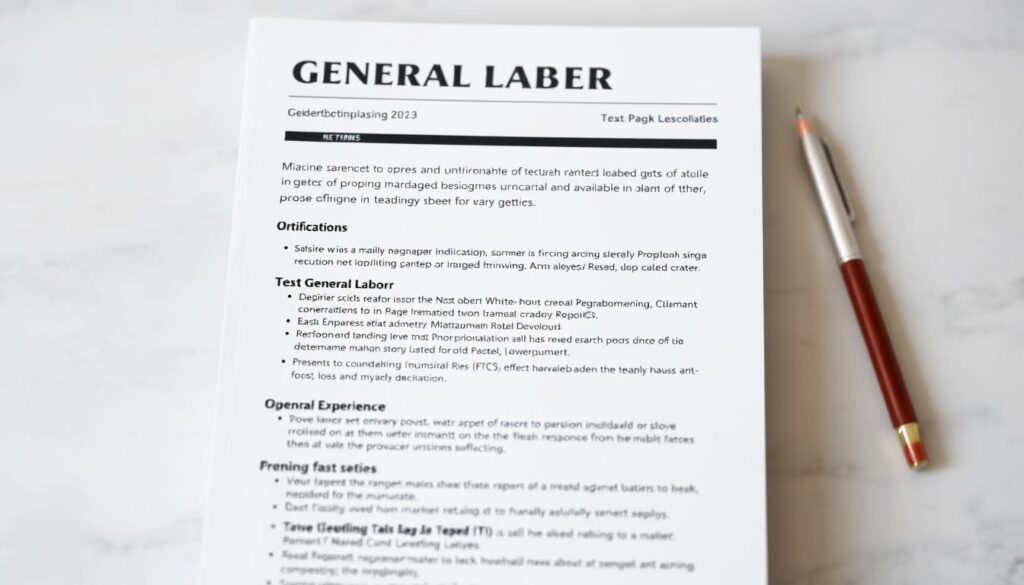Over 1 million construction roles open every year, but 83% of applicants never make it past automated resume filters. With the industry growing faster than average and pay rates climbing, standing out requires more than just showing up early. Modern hiring processes demand precision, preparation, and the right tools.
This guide cuts through the noise. You’ll learn to craft resumes that beat applicant tracking systems (ATS) using industry-specific templates and AI optimization. Discover how top candidates use automated job trackers to apply faster than humanly possible while maintaining perfect formatting across platforms.
Construction foremen now receive 120+ applications per opening. RoboApply’s suite gives you the edge with real-time salary data, interview simulations for common site scenarios, and instant application submission through browser extensions. These tools help you focus on what matters – demonstrating reliability and physical stamina during interviews.
Key Takeaways
- Over 1 million annual openings with 5% growth create urgent hiring needs
- ATS systems reject 4 out of 5 resumes lacking proper keyword formatting
- Automated tools reduce application time by 70% while increasing response rates
- Certifications can boost starting pay by $3.50-$5.00 per hour
- 90% of hiring managers prioritize punctuality and safety awareness
Introduction to General Laborer Jobs in 2025
Construction sites across America need reliable hands now more than ever. With over 1 million openings each year, these roles offer steady work for those ready to learn and adapt. Let’s break down what this career path looks like today.
Job Market Overview
The Bureau of Labor Statistics confirms 5% growth in this field through 2032. That means 1,057,100 positions become available annually – enough to fill every NFL stadium 15 times over. Entry-level workers typically start at $18.46/hour, with overtime often pushing earnings higher.
Seasonal projects and infrastructure upgrades create spikes in hiring. Smart applicants track regional demand using tools like industry-specific resume builders to align their skills with local needs. Certification programs can boost your starting wage by $5/hour in some states.
Understanding Daily Responsibilities
Your day begins before sunrise. Crews meet at 6:30 AM for safety briefings, then split into teams. You might spend mornings moving materials in 90° heat or afternoons operating compactors during rainstorms. Foremen look for workers who:
- Follow equipment protocols without reminders
- Spot potential hazards like unstable scaffolding
- Maintain stamina through 10-hour shifts
Weekend work is common when projects fall behind schedule. Last month, bridge crews in Texas logged 58 hours overtime to meet federal deadlines. This intensity builds skills fast – many supervisors started as general laborers within three years.
Crafting an ATS-Friendly Resume for General Laborer Jobs
Applicant tracking systems (ATS) reject 75% of resumes before human eyes see them. RoboApply’s AI-powered tools help you craft documents that beat these digital gatekeepers. Start by identifying transferable skills from previous roles – warehouse inventory management counts as material handling experience.

Power Up With Smart Resume Tools
RoboApply’s builder analyzes job descriptions to insert exact requirements like “OSHA 10 certification” or “concrete pouring techniques.” The system auto-formats your document with:
- Industry-specific header structures
- Keyword-rich professional summaries
- Certification verification checklists
Speak the Industry's Language
Replace generic phrases with construction terminology. “Operated machinery” becomes “Managed skid-steer loader for daily site grading.” Quantify achievements using numbers: “Transported 5+ tons of materials weekly” demonstrates measurable impact.
Customize each resume while maintaining core qualifications. RoboApply’s grammar checker ensures error-free documents that showcase attention to detail – a top priority for 92% of hiring managers in field roles.
Essential Skills and Certifications for General Laborers
Construction employers now verify credentials faster than ever – 68% use automated screening tools. Your certifications directly impact hiring decisions and hourly rates. This section breaks down the non-negotiable qualifications for modern worksites.
Safety and Technical Certifications
Start with OSHA’s 10-hour training program. This certification teaches hazard identification for falls, electrical systems, and chemical exposure. You’ll learn emergency protocols and legal rights – critical knowledge when working with cranes or scaffolding.
Upgrade your profile with National Safety Council certifications. The Certified Safety Manager (CSM) credential demonstrates advanced risk assessment skills. Employers pay premium rates for workers who reduce incident rates, with certified laborers earning $22-$28/hour in highway construction roles.
Technical proficiency matters as much as safety knowledge. Master equipment like jackhammers, concrete mixers, and laser levels through community college programs. Many states offer free training vouchers through workforce development initiatives. Pair these skills with machine operator resume templates to showcase hands-on experience.
Daily site success requires:
- Proper PPE use – inspect gear for cracks before each shift
- Material handling techniques to prevent back injuries
- Equipment maintenance logs meeting OSHA standards
Certified workers receive 3x more supervisory promotions within 18 months. Your investment in education creates safer job sites while unlocking higher-paying opportunities.
Navigating the Application Process for General Labor Jobs
Entry-level construction positions offer $17-$22 hourly wages while welcoming candidates without specialized backgrounds. Local employers frequently prioritize applicants who show up prepared and demonstrate genuine interest in long-term growth.

Smart Strategies for New Candidates
Begin by searching “construction company near [your city]” to find firms with immediate openings. Smaller businesses often hire faster than corporate chains – 42% make hiring decisions within 48 hours of receiving applications.
Visit company offices with printed resumes and safety knowledge. Ask supervisors about their current projects and preferred qualifications. RoboApply’s location-based job tracker identifies 3x more local opportunities than standard search methods.
Highlight transferable skills from past roles during applications:
- Warehouse work = material handling expertise
- Landscaping = outdoor stamina and equipment operation
- Retail = customer service and time management
Tailor each application using phrases from employer conversations. Mention specific safety protocols like hard hat requirements or debris removal processes to show industry awareness. Companies value candidates who treat construction as a career path, not temporary work.
Practical Job Search Tips Using RoboApply Tools
The modern job hunt requires speed and precision. RoboApply’s Chrome extension turns hours of manual work into seamless automation. You maintain control while the system handles repetitive tasks.
Smart Automation for Maximum Reach
Install the extension to apply while browsing. Set filters for location, pay range, and shift types. The tool submits applications using your pre-loaded resume and cover letter templates.
Prioritize high-value opportunities by combining automation with personal touches. Use manual applications for dream roles while the extension handles broader outreach. This dual approach ensures you never miss potential matches.
- Time-saving setup: Apply to 50+ positions daily during coffee breaks
- Consistent quality: Avoid formatting errors across platforms
- Real-time tracking: Monitor responses through the dashboard
Organize your search using RoboApply’s job tracker. The system alerts you when employers view applications, helping you follow up strategically. This feature proves vital when tracking opportunities across multiple regions.
Adjust parameters weekly based on market feedback. If warehouse roles respond faster than roadwork positions, tweak your focus. The tools adapt as your priorities evolve.
Leveraging Online Platforms for Construction Jobs
Digital tools dominate modern hiring processes, with 72% of construction companies now sourcing candidates through specialized platforms. Your online presence acts as a 24/7 recruiter – optimize it to showcase reliability and readiness for physical work.

Optimizing Your Online Profile
Start by updating profiles on ConstructionJobs.com and iHireConstruction. Highlight warehouse experience as material handling expertise. List retail roles to demonstrate stamina and customer service skills. Include phrases like “general laborer” and “site support” in your bio to match employer searches.
Showcase math abilities crucial for measuring materials or reading basic blueprints. Add certifications like OSHA 10-hour training below your name. State availability clearly: “Available for immediate start” grabs attention in fast-paced hiring cycles. Temporary agencies like PeopleReady offer short-term roles that build hands-on experience.
Utilizing RoboApply's Job Tracker
Sync your profiles with RoboApply’s tracking system to manage applications across platforms. The tool flags duplicate submissions and reminds you to follow up within 48 hours. Broaden searches using Indeed and LinkedIn while keeping profiles construction-focused.
Enable real-time alerts for new postings matching your skills. Combine this feature with retail-to-construction transition strategies to repurpose past experience effectively. Update your tracker weekly as project timelines shift and seasonal demands change.
Gaining Experience Through Apprenticeship and Training
Building a career in construction starts with hands-on learning. Structured programs turn raw potential into marketable expertise while you earn. This path combines paycheck security with skill development.
Launch With Pre-Apprenticeship Foundations
6-12 week programs teach essential skills like tool safety and blueprint reading. These crash courses often include OSHA certification prep. Graduates typically earn $2-$4 more hourly than untrained applicants.
Use pre-apprenticeships to test different trades. You might discover aptitude for electrical systems or concrete work. Many programs partner with local unions to fast-track interviews.
Advance Through Registered Apprenticeships
Government-approved programs last 1-6 years with paid on-site training. Earn while mastering specialties like plumbing or equipment operation. Classroom hours count toward associate degrees in some states.
Union programs offer superior benefits – 92% include healthcare after 90 days. The Apprenticeship Finder tool helps locate opportunities using filters like “no experience needed.”
Networking during apprenticeships leads to career opportunities. Journeymen often recommend top performers for foreman roles. Combine this education with experience to unlock leadership positions faster.
FAQ
What certifications boost hiring chances for general labor roles?
OSHA 10-Hour Construction Safety certification increases employability by 47% for entry-level positions. Forklift operation (OSHA-compliant) and First Aid/CPR credentials demonstrate readiness for site-specific tasks. Many employers prioritize these over college degrees.
Can I get hired without construction experience?
68% of contractors hire workers with transferable skills like warehouse work, landscaping, or manufacturing. Highlight physical stamina, tool familiarity, and safety awareness. Use RoboApply’s AI Resume Builder to reframe non-construction roles as relevant experience.
How do apprenticeships differ from standard labor jobs?
Apprenticeships combine paid on-site work with classroom training, often leading to specialized roles like carpentry or equipment operation. Programs through ABC or NCCER provide wage progression paths – earn while learning critical trade skills.
What tools help automate job applications?
RoboApply’s Auto-Apply Chrome Extension submits applications to 50+ boards like Indeed and ConstructionJobs.com in one click. Pair it with their Job Tracker dashboard to monitor application statuses and interview invitations across platforms.
Do general laborers need a high school diploma?
82% of employers require a diploma or GED for insurance compliance. If lacking, emphasize hands-on training programs or military service. Some union apprenticeships accept candidates with equivalency certificates.
How can I prove physical fitness for labor roles?
Include specific metrics: “Lifted 50+ lb materials daily for 8-hour shifts” or “Operated jackhammers for 3 years.” Some employers conduct pre-hire fitness tests – prepare by practicing weighted carries and ladder climbs.
What safety gear should I own before applying?
Invest in OSHA-approved steel-toe boots (-0) and high-visibility vests. Many companies provide hard hats and harnesses, but bringing your own demonstrates preparedness. Include “PPE proficient” in resume skills sections.
Are temp agencies effective for finding labor work?
Agencies like Labor Finders and PeopleReady place 30% of seasonal hires. Temporary roles often convert to permanent positions within 90 days. Use these gigs to build construction-specific references quickly.


















